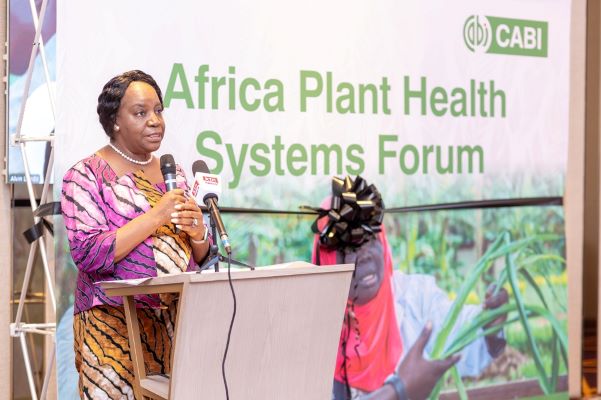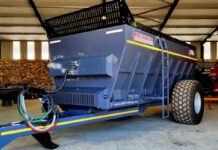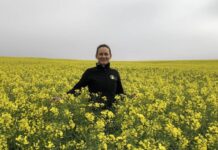
The inaugural African Plant Health Systems Forum has highlighted the strength of partnerships and knowledge-driven solutions towards greater sustainable food security for a growing African population expected to reach 2.5 billion by 2050.
CABI, organised and launched the event, which brings together representatives from CABI’s African Member Countries, including government, development, research, farmer and private sector/industry colleagues, that was themed “Knowledge Driven Solutions for Africa’s Plant Health Systems.”
Presentations and remarks from CABI staff and partners highlighted successes of major CABI-led initiatives in Africa, such as PlantwisePlus, as well as CABI’s Sanitary and Phytosanitary Strategy, and biocontrol in the context of climate change.
They also gave examples of ongoing work relating in Kenya, Zambia and Uganda relating major pests and diseases such as the fall armyworm pest, cassava brown streak disease and papaya mealybug.
Updates were also given on CABI’s International Development Business Plan, which aligns closely with its Medium-Term Strategy 2023-2025 that Member Countries and partners have had an important part to play in its creation and implementation.
Multitude of challenges to secure livelihoods and food security
Chief guest Hon. Chileshe Mpundu Kapwepwe, Secretary General of the Common Market for Eastern and Southern Africa (COMESA) and Chair of the CABI Board, gave a keynote speech and said healthy plant health systems can benefit national, regional and continental development.
However, she added that Africa’s 33 million small-scale farmers, which produce up to 90% of food production in some sub-Saharan African countries, face a multitude of challenges to secure livelihoods and food security including invasive species, crop pests, and diseases, which are exacerbated by the impact of climate change.
Hon. Chileshe Mpundu Kapwepwe said, “At COMESA, we understand that safeguarding plant health is vital not only for boosting agricultural productivity but also for enhancing intra-regional trade and economic integration.
“Our phytosanitary regulations and plant health protocols harmonize pest management efforts, quarantine measures, and disease control across member states. A unified approach to plant health enables smoother movement of goods, reduces trade barriers, and enhances food security across the region.
“This Forum serves as an important step toward enhancing Africa’s collective voice on these issues, aligning with the broader goals of Agenda 2063 and the African Continental Free Trade Area, where plant health is integral to agricultural transformation and trade.”
Work designed to empower farmers and communities
Dr Morris Akiri, CABI’s Senior Regional Director, Africa, said climate change, pest infestations – such as the fall armyworm which in Africa alone is estimated to cause 8 to 20 million tonnes of maize losses each year – soil degradation, and limited access to resources are a few of the hurdles smallholder farmers encounter daily.
Dr Akiri said, “Smallholder farmers often lack the tools, knowledge, and support needed to combat these issues effectively.
“This is where CABI steps in. Our work in agriculture and the environment is designed to empower farmers and communities, providing them with the knowledge and resources they need to thrive.
“Through partnerships, we leverage our expertise in research and data to develop innovative solutions, including biocontrol methods and integrated pest management strategies that are environmentally friendly and sustainable.”
Ensuring sustainability and building resilience in our food systems
Meanwhile, Dr Eliud Kiplimo Kireger, Director General of the Kenya Agricultural and Livestock Research Organization (KALRO), said that by working in partnership with CABI and others, KALRO has tackled some of the most pressing plant health issues facing farmers, including the desert locust.
“These partnerships, involving not only CABI but also esteemed institutions such as KEPHIS, National Museums of Kenya, KEFRI, Universities and local county governments, have directly contributed to safeguarding Kenya’s food security,” he said.
He added that in Kenya alone, Plantwise has established hundreds of plant clinics, where farmers, guided by plant doctors, can receive real-time plant health advice and access vital information. Through this, there has been a tangible improvement in crop productivity, enhancing the incomes of farming communities.
Dr Eliud Kiplimo Kireger said, “As we continue this journey together, I am confident that through continued collaboration with partners like CABI and others in the region, we will be able to meet the growing challenges of plant health and food security. Our focus must remain on fostering innovation, ensuring sustainability, and building resilience in our food systems.”
Work deeply rooted in the principles of collaboration and partnership
Dr Dennis Rangi, CABI’s Director General, Development, said CABI has a long-standing commitment to advancing international development, with its work deeply rooted in the principles of collaboration and partnership.
Dr Rangi said, “By working together with our partners, we are amplifying our impact and driving innovative solutions that address the complex challenges facing agriculture and plant health worldwide. Our engagement with Association of International Research and Development Centers for Agriculture (AIRCA) exemplifies this approach.
“As we look to the future, we see immense opportunities within international development. The growing recognition of plant health as a critical component of sustainable agriculture opens doors for innovative partnerships and funding avenues.
“By capitalizing on this momentum, we can drive impactful projects that enhance food security, improve livelihoods, and contribute to the overall health of our ecosystems.”
Henk van Duijn, President and CEO of the International Fertilizer Development Center (IFDC), also in attendance, emphasized the importance of the forum, noting its timely focus on uniting diverse stakeholders across the entire plant system. He pledged IFDC’s support to build and grow the forum to ensure the scaling of solutions for Africa’s plant health systems.
CABI and IFDC are both members of AIRCA.
Hon. Chileshe Mpundu Kapwepwe reiterated that COMESA, along with Regional Economic Communities (RECs) like the East African Community (EAC), Southern African Development Community (SADC), Intergovernmental Authority on Development (IGAD), and Economic Community of West African States (ECOWAS), promotes harmonized policies, coordinated actions, and regulatory alignment to address plant health.
In August this year CABI pledged its support for the Plant Health Strategy and the Implementation Plan for Africa 2022-2036 as it was launched by the African Union Inter-African Phytosanitary Council (AU-IAPSC) in Addis Ababa, Ethiopia.
CABI provided technical expertise for the development of the plant health strategy and worked with AU-IAPSC, under USDA-FAS support, to provide technical expertise and financial support to develop the implementation plan.
Relevant stories
- ‘CABI supports the Plant Health Strategy and the Implementation Plan for Africa 2022-2036.’
- ‘CABI provides technical expertise to help implement the Plant Health Strategy for Africa.’
- ‘New project aims to enhance national and regional phytosanitary research coordination.’
- ‘CABI contributes to baseline survey on emerging pests in Eastern Africa.’








